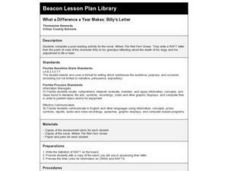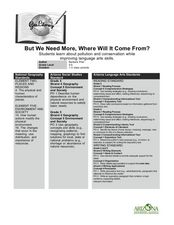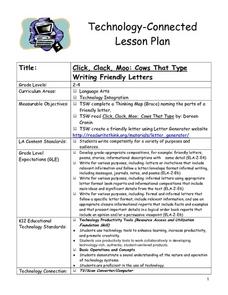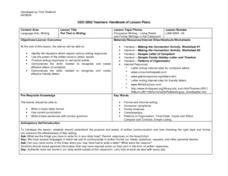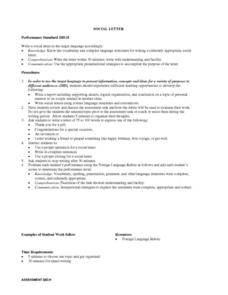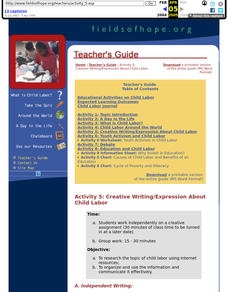Curated OER
My Own Backyard
Students explore and react to the painting The Road to Santa Fe. In this interacting with art lesson, students locate various objects in the painting. Students copy the angle of objects by using their bodies. Students discuss light and...
Curated OER
Not Getting the News about the Stamp Act
How did American colonists react to the Stamp Act of 1765? Your young historians will examine primary source material by reading excerpts from a transcription of the Pennsylvania Gazette and then identifying the sentiments expressed by...
National September 11 Memorial & Museum
Local Heroes
The cover of The New Yorker magazine sparks a conversation about September 11th and the invaluable sacrifices the first responders made to rescue those in danger. Scholars discuss their observations, thoughts, and feelings then take pen...
EngageNY
Grade 9 ELA Module 1, Unit 2, Lesson 4
As a mid-unit assessment, class members demonstrate their understanding of the concepts covered so far by crafting a formal, multi-paragraph essay in which they analyze how Rainer Maria Rilke's word choices develop the meaning and tone...
Literacy Design Collaborative
Exploring Character Development in The Watsons Go to Birmingham - 1963
How did the Civil Rights Movement affect young people in the United States? Scholars read Christopher Paul Curtis' novel, The Watsons go to Birmingham - 1963. Next, they write compare and contrast essays showing how the main characters...
US National Archives
Eastern Europe 1939-45 — Camps
Britain's decision not to bomb German death camps in World War II has provided many questions for historians, but with a primary source analysis lesson, high school students may be a step closer to finding out the truth. Learners read...
Curated OER
Pen Pals
Fifth graders become pen pals from other countries and research their countries for information that help with their writing. This information is then sent to another student who is also portraying someone from another country.
Curated OER
Rock Swap
Learners collect rocks found locally and write a brief description which includes the name of the rock, whether the rock is sedimentary, metamorphic, or igneous, and what uses the rock has. They exchange rocks with another class in...
Curated OER
What a Difference a Year Makes: Billy's Letter
Seventh graders read, "Where the Red Fern Grows" and write a RAFT letter from the point of view of the character Billy to his grandpa reflecting on the death of his dog and his adjustment to life in town.
Curated OER
But We Need More, Where Will It Come From?
Young scholars write a persuasive letter and create a poster about pollution and conservation. In this pollution and conservation lesson plan, students learn how humans are the number 1 cause of pollution.
Curated OER
Asking for Information
In this asking for information worksheet, students correct mistakes, join phrases, and write an email, all having to do with information. Students correct 8 sentences, connect 10 phrases to make 5 sentences, and write 1 email.
Curated OER
The Mail Race
Students create friendly letters and surveys to other schools. In this letter writing instructional activity, students format friendly letters to other school and request a reply. Students chart the replies on a map and share information...
Curated OER
In 'Other words' Writing Gently Humorous Essays About Stereotypes
Define and understand what stereotypes are by reading an article with stereotyping in it. Students will locate how it shows stereotyping and answer questions about the stereotypes. Finally, they will write their own pieces of original work.
Curated OER
Letter Writing Basics
Students construct a letter about a classroom issue as a class. They then write a letter individually that requests information, file a complaint or complement, or write a letter to the editor/legislator.
Curated OER
Cows That Type Friendly Letters
Students engage in a lesson that introduces the parts of a letter. The lesson is taught using a powerpoint presentation with the purpose of integrating technology into instruction. Students create a letter and thinking map to challenge...
Curated OER
Big Bubble Letter Poster
In this getting to know you worksheet, students follow the directions to create bubble letters for their names and then fill each letter with information about themselves.
Curated OER
Put That in Writing
High schoolers identify life situations which require various writing responses, use the power of the written word to obtain results, practice writing responses to real-world events, and demonstrate the skills needed to recognize and...
Curated OER
Social Letter
Students write social letter to friend or penpal in target foreign language to demonstrate knowledge of vocabulary and complex language structures, write with understanding and facility, and use appropriate presentational strategies to...
Curated OER
Advocacy Through Letter Writing
Pupils develop an advocacy plan to address a health-related need for a local, national or global health problem. Students write a detailed letter as part of their advocacy plan.
Curated OER
Amelia Bedelia (Persuasive Writing)
Learners read and discuss the book "Amelia Bedelia". They brainstorm all of the options certain characters in the book could have done instead of what they chose to do. They decide if the decision was a good or bad. They write a...
Curated OER
Activity 5: Creative Writing/Expression About Child Labor
Young scholars research child labor using Internet resources. They present the information in a creative writing piece and post it on Chalkboard.
Curated OER
A Letter Home
Second graders brainstorm a list of jobs that a crew member of the HMS Victory would perform. They participate in a guided reading of the "Sea and Learn" notes about working at sea by writing notes as the listen to text. Next, they write...
Curated OER
Business Writing Lesson Plan:
Students learn the importance of business writing, including content and presentation. They improve their usage of punctuation and commas.
Curated OER
Shortened Words
Shorten names and words with different activities. Nicknames, acronyms, and shortened words (fridge instead of refrigerator, for example) are ways for third graders to build their vocabulary and differentiate between formal and informal...










